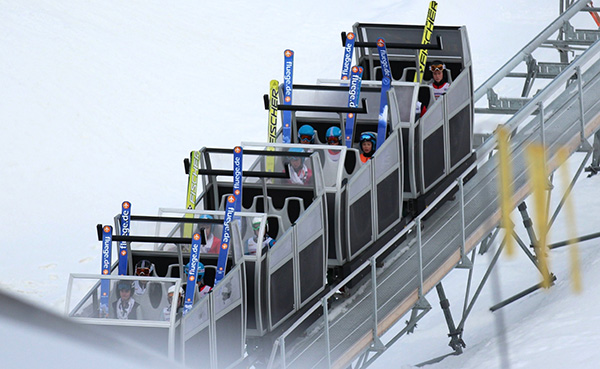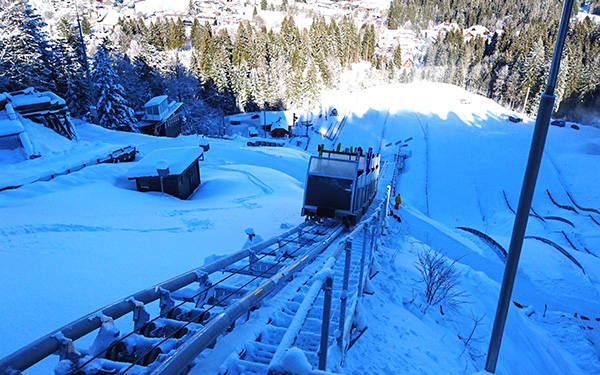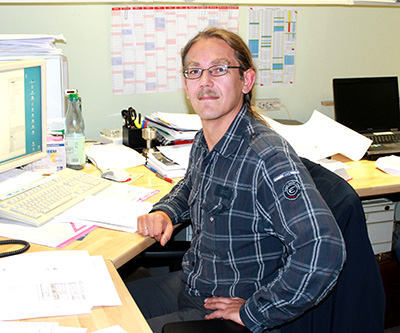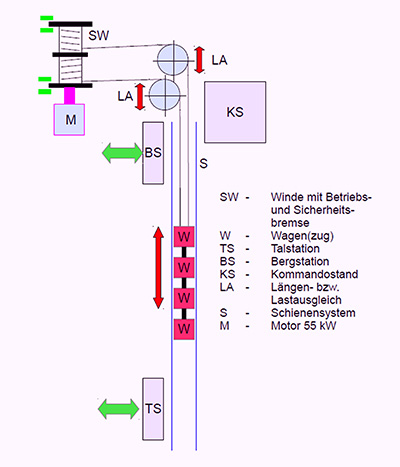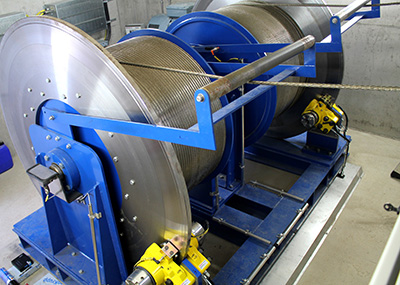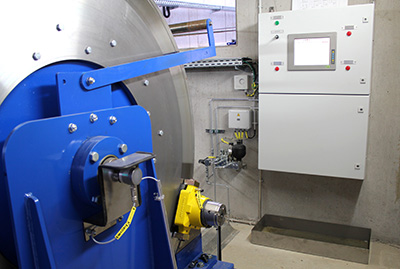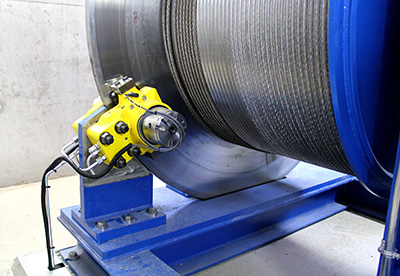2016-12-12
Safe descent on a steel rope
Brake control systems by RINGSPANN convince German cableway manufacturer
During the implementation of a new uphill and downhill cableway for the Adlerschanze ski jumping hill in Hinterzarten, German company Wiegand placed its trust in RINGSPANN’s brake technology. Wiegand made the innovative BCS 600 brake control and monitoring system the pivotal element of the safety concept of its rail-guided car train system. The special challenge here being: cableways and chairlifts may only employ braking systems that ensure personal safety and are in line with the EU cableway directive.
Stefan Eberhardt knows all too well about the safety issues in cableway construction. As a development engineer at Josef Wiegand GmbH, which is headquartered in Rasdorf in East Hesse, he has already assumed responsibility for many cableway, ski lift and cable car projects. And so when the Black Forest resort of Hinterzarten was looking for a new uphill and downhill cableway to transport persons at its traditional Adlerschanze ski jumping hill, he was again the one who ended up handling the request. In addition to the fundamental ecological requirements of this project, the functional specifications included ease of use, a high degree of automation and a very high safety standard. The Wie-Li® product from the Wiegand product range (www.wiegandslide.de) proved to be the ideal replacement for the outdated Adlerschanze chairlift. “Our shuttle Wie-Li® is a modern pull-rope solution where a car train moves uphill and downhill on rails. In Hinterzarten, this train consists of four coupled cars allowing up to 24 passengers to climb a height difference of 80 metres at a speed of up to 2.4 m/s”, explains Stefan Eberhardt.
Large winches, powerful discs
The major system components of the new shuttle car system now in operation include, alongside the open cars with 6 seats each and the 200-metre-long railway line, an upper and a lower station as well as a technical command post. At the heart of dynamic driving is the uphill winch drive station, with its two large winches driven by a 55 kW motor and its brake system. The car train, which is 14 metres long and weighs almost five tons when full, is driven and controlled from here. This means it is pulled uphill by the two drum winches over two redundant steel ropes, and decelerated and stopped downhill by a braking system that ensures personal safety. Since the train handles maximum gradients of up to 62 percent when driving, little imagination is needed to suss out what great importance the brake system has is in this case. Stefan Eberhardt of Wiegand explains: “As a manufacturer, we have to use a brake system that meets the safety requirements of EU directive 2000/9/EC. The selection of components has to be such that the corresponding certification process is as simple as possible to implement. The EU conformity of the system is demonstrated by the certification from a notified body."
On the way to certification
In the run-up to the Adlerschanze project, Eberhardt and his team of developers had already become aware of a brake system that seemed tailor-made to enable them to implement complex safety and automation-related requirements: The innovative brake control and monitoring system BCS 600 from RINGSPANN. The company from Bad Homburg is one of the leading manufacturers of industrial brakes and, with the BCS 600, offers an intelligent complete solution for the automated and highly precise control of hydraulically activated or hydraulically released brakes. It is predestined for the implementation of demanding braking operations and also assumes essential safety and monitoring functions. "We were instantly taken by this system consisting of a control unit with an integrated hydraulic unit and the industrial brakes of RINGSPANN, for it seemed to be the ideal solution for the emergency stop system in our rail-guided Wie-Li®. There was one drawback however: it did not yet have a specific EU cableway approval", reports Stefan Eberhard.
What would have been a knock-out for other brake manufacturers turned out to be just a minor hurdle for RINGSPANN. For the BCS 600 had been developed based in particular on the company’s expertise accumulated over decades in elevator car technology, mining hoisting technology and in escalator engineering. “This means that the product had been shaped by both engineering knowledge from passenger transport and from pull-rope and rope winch technology. And so it was easy for us to offer the necessary support for the certification of the braking system", explains Franz Eisele, Head of Division Brakes and Couplings at RINGSPANN. Sped up by the administrative support and the transfer of know-how with the Wiegand development team, Franz Eisele and his brake technology specialists quickly managed to implement all requirements necessary for the certification in accordance with the EU cableway directive. This cleared the way for RINGSPANN’s brake system to be used in the safety concept of the Wie-Li® system at the Adlerschanze.
Four brakes with different tasks
There are a total of four brakes responsible for the dynamic driving of Wiegand’s shuttle train. While an electrical and an electromechanical brake are responsible for the general driving operation (uphill, downhill, standstill), two spring activated and hydraulically released disc brakes of the type HW 075 FHM by RINGSPANN are what form the safety and emergency stop mechanism of the Wie-Li® system. They each unfurl their clamping forces of up to 40 kN on two powerful brake discs located on the outer front sides of the rope drums. These RINGSPANN brakes are normally closed brakes designed in such a way that each of them is capable of delivering the necessary total braking power single-handedly in the event of an emergency (redundancy). If a rope tears or the drive fails, the safety brakes jump in and stop the car train. Irrespectively of the weight of the cars and the slope, they maintain a constant deceleration of approximately 1.0 m/s2. If the entire Wie-Li® system is switched off, the RINSGPANN brakes function as holding brakes.
The intelligent control and monitoring of the safety brakes is carried out in the BCS 600 from RINGSPANN. This innovative system allows the braking force of hydraulically activated and hydraulically released brakes to be precisely controlled. This is carried out via the precise regulation of the hydraulic pressure, the actual values of speed or hydraulic pressure being compared with the target values in a real-time measurement. "If the measured deviations are too great, the hydraulic pressure is adjusted accordingly, allowing the pre-set braking time or deceleration to be achieved. At the same time, particularly flat brake ramps at the end of braking preserve the dynamic load of the system", explains Achim Mayer, development engineer at RINGSPANN.
Fast and powerful gripping
The BCS 600 basically allows the control and monitoring of braking operations in accordance with three different specifications or with three different brake ramp functions: A defined braking time, a specified delay or a given number of revolutions (braking distance). Achim Mayer stresses that “the fast bridging of the brake gap and a regular ‘braking clean’ of the brake disc ensures the shortest reaction times and high friction coefficients right at the beginning of the braking process". The two safety brakes on the rope winches of the Wie-Li® system would therefore immediately grip tight in the event of an emergency and bring the system to a halt!
The inner workings of the BCS 600 include a faster IPC with a real-time capable operating system and a controller with a variable selection of I/Os ensuring a speedy measurement value processing and a lag-free control and regulation. Via various fieldbus interfaces (Ethercat, Profibus, CANOpen), the braking system is integrated into the higher-level system and allows bi-directional communication. "There is also the option of integrating the braking system into the operator’s network. Via the Ethernet connection, he can then track the braking operations in real time or check the current operating data, without him having to be directly present on site", explains development engineer Mayer. The other quality features of the BCS 600 from RINGSPANN include an intelligent design of the hydraulic unit, the use of heavy-duty high-quality components and seat valve technology with a large cross-section – all aspects that ensure a high level of system reliability and safety. RINGSPANN also offers the BCS 600 with a touch panel as an option.
The next project
For Stefan Eberhardt and his team of developers at Wiegand, the use of the BCS 600 from RINGSPANN in the Wie-Li® system at the Adlerschanze was a première that paid off. "We are now absolutely convinced by this system solution, especially as it enables us to give the operator the option of monitoring and documenting many additional system and brake system parameters and components as part of his safety and maintenance concepts. Such parameters include the system’s direction of rotation, the condition of the brake pads, the function of the brake spring packages, the hydraulic pressure, the oil temperature and, via the speed difference measurement, the drive train", explains the cableway expert. He finishes by adding that the BCS 600 has already been scheduled for the next project, where it will be used in a funicular railway in Austria.
